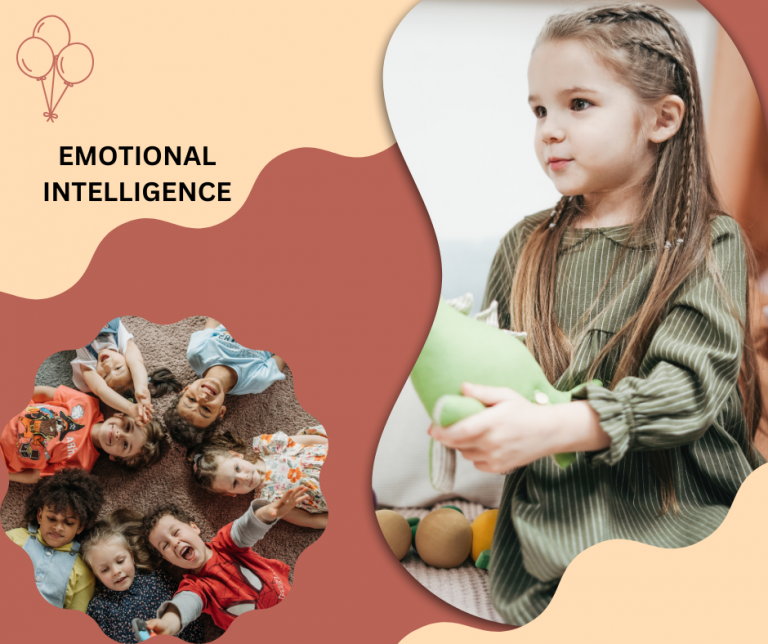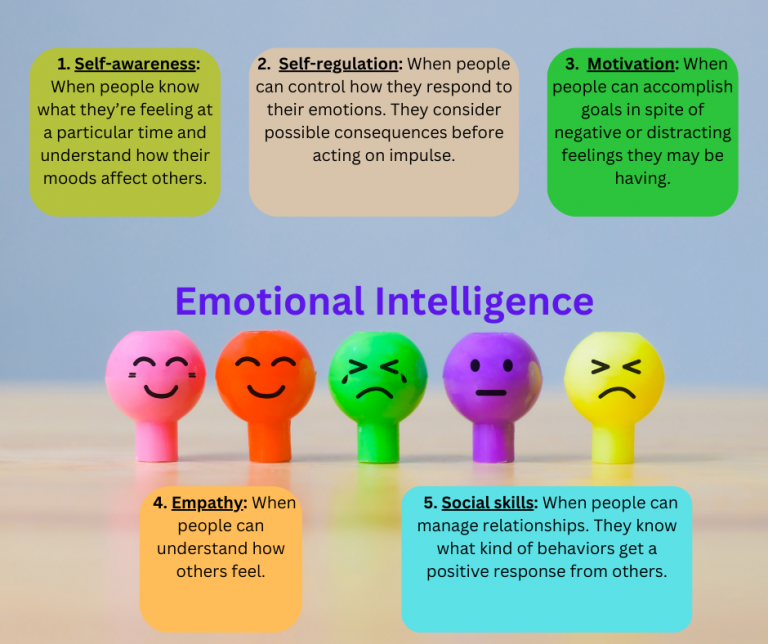
02 Oct 5 Tips For Nurturing Emotionally Intelligent Children

Alex has a strong awareness of his own emotions. He can easily identify and articulate his feelings when he feels upset, angry, or happy. He might say, “I’m feeling frustrated because I couldn’t solve that math problem.”
When Alex’s friend is sad or upset, he offers comfort and support. “I’m here for you. It’s okay to feel sad. Do you want to talk about it?” he asked his friend.
If your child shows the same signs as Alex, congratulations, your child has high emotional intelligence.
But what if it’s the opposite? How do you nurture your child’s emotional intelligence?
What is emotional intelligence?
Emotional intelligence (EI) is defined as a person’s ability to express and manage feelings appropriately while respecting the feelings of others.
The good news is it’s a set of skills children can learn at any age.
The concept of EI has been around for decades. It was made popular by the 1995 book Emotional Intelligence: Why It Can Matter More Than IQ. The author, psychologist Daniel Goleman, described EI as having five basic parts: self-awareness, self-regulation, motivation, empathy, and social skills.

Why is Emotional Intelligence important for kids with learning and thinking differences?
The outcome would be different without emotional intelligence. If Alex had low emotional intelligence, he might react differently: he would be sad about his inability to solve the math problem and leave it there without calling for help from someone else. And he would not recognize his friend’s upset.
Lack of emotional intelligence will prevent children from being successful in the future when they have to work and interact with people.
Here are some of the key benefits of fostering emotional intelligence in children:
• Improved Self-Awareness: Children with strong EI are adept at comprehending their emotions, enabling them to identify and label their feelings accurately. When children possess the ability to self-soothe when experiencing anger, they are more likely to navigate challenging circumstances with resilience and success.
• Healthy Relationships: Children possessing a high level of emotional intelligence exhibit enhanced interpersonal abilities. They excel in empathizing with others, comprehending diverse viewpoints, and establishing more robust and positive connections with their peers and adults.
• Effective Communication: Emotional intelligence empowers children to communicate more effectively, clearly articulating their thoughts, emotions, and needs. This, in turn, fosters improved communication not only with their peers but also with adults.
• Academic Success: EI can have a positive influence on academic achievement. Children with strong emotional intelligence exhibit improved concentration, enhanced problem-solving capabilities, and a greater capacity to manage academic stressors effectively.
• Less Stress and Anxiety: Children with high EI often experience less stress and anxiety because they can manage their emotions effectively and have the support and coping strategies to deal with stressors.
• Lifelong Skill: Perhaps most importantly, emotional intelligence is a lifelong skill. Children who develop high EI tend to carry these skills into adulthood, contributing to personal and professional success.
How can you help your child foster Emotional Intelligence?
As a parent, you can reflect on your child’s developmental journey. Your child may have experienced frequent tantrums during their toddler years due to a lack of emotional understanding. However, as they progressed to the ages of 4 to 5, they likely became more composed. As elementary-aged children, they have developed much better emotional regulation skills.
It’s worth noting that children can gradually cultivate emotional intelligence through their own experiences.

But parents can boost an emotionally intelligent child by following this 5 tips:
1. Validate your child’s Feelings
Let your children know that their emotions are valid and important. Your children should avoid dismissing or minimizing their feelings. Instead, it is better to show empathy and understanding. Parents can say, “I understand that you’re feeling scared. It’s okay to feel that way, and I’m here to support you.”
Your child can develop a vocabulary for emotions by labelling feelings when they arise. You encourage them to express what they are feeling instead of ignoring it. For example, using feeling words in your everyday conversation and practising talking about them is helpful. Your child may say things like, “I feel angry when I see kids being mean on the playground,” or “I feel happy when all family members go out for dinner.”
2. Encourage Empathy and Perspective-Taking
Cultivating empathy and fostering perspective-taking skills are fundamental to nurturing a child’s emotional intelligence. Parents play a pivotal role in guiding their children to consider the emotions and viewpoints of others, as well as in discussing how their actions can have an emotional impact on those around them. Encouraging children to step into another person’s shoes and imagine how someone might feel in a specific situation is a powerful approach. For instance, prompting them with questions like, “Can you imagine how your friend felt when you shared your toys with them?” can help them develop these vital emotional skills.
3. Teach specific skills for calming down
For instance, practising deep breathing can teach your child to regain composure when experiencing anger. A child-friendly technique to teach them is the “bubble breaths” method. In this approach, they simply inhale through their nose and exhale through their mouth, as if they’re blowing through a bubble wand.
Additionally, you can assist your child in creating a personalized toolkit to help them regulate their emotions. This toolkit can include items like a colouring book, a favourite joke book, calming music, and pleasantly scented lotions. These items engage their senses and promote emotional calmness. Store these items in a specially decorated box, and when your child is upset, you can suggest that they retrieve their calming toolkit and use these resources to manage their emotions.
4. Model Emotional Intelligence
Children gain valuable insights by observing their parents and caregivers. Parents can effectively demonstrate emotional intelligence by openly and healthily expressing their own feelings. Engage in discussions about your emotions and illustrate constructive ways to manage them. As an illustration, you might convey, “Today, I experienced frustration due to heavy traffic, but I chose to calm down by taking some deep breaths.” This not only imparts emotional wisdom but also provides a practical model for handling emotions.
5. Create a safe and open environment
Promoting a safe and nurturing environment is pivotal for the holistic development of children. Both parents and educators play an essential role in cultivating an atmosphere where youngsters can freely articulate their emotions without apprehension regarding criticism or reprimand.
Dedicating quality time to engage in constructive extracurricular pursuits with your children can significantly bolster their emotional expressiveness. Activities such as art, journaling, or learning musical instruments can be powerful tools for fostering emotional development. Furthermore, these endeavours can enhance children’s social skills, empowering them to thrive in various interpersonal settings.
Conclusion
Emotional intelligence is an enduring skill that matures gradually throughout a lifetime. It’s essential for parents to remain patient and steadfast in their efforts to foster emotional intelligence in their children.
Incorporating the previously mentioned tips into your parenting approach can empower your child to acquire the essential tools for comprehending, regulating, and manoeuvring through their emotions adeptly. This, in turn, can pave the way for healthier relationships and an overall sense of emotional well-being.
By taking these small steps, you’re enabling your children to evolve into adults who can empathize, communicate effectively, and skillfully navigate challenging situations in their future endeavours.


